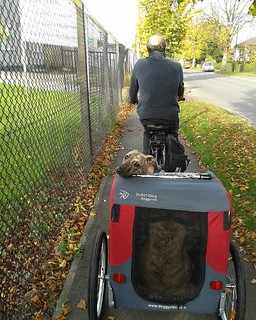Is the future of caravaning limited?
I recently read an artical that stated that the aim of the Green Brigade, is to have everyone driving a battery only powerd car, within the next 20 years Unless giant steps in battery performance are made during this time scale, it would seem that once the
van is hitched up, I will not be going very far (based on the pathetic range of current electric cars driving solo). Also what are all those folks who park on the road going to do? Can you imagine
walking down a street at night, where everyone has got an electric cable hanging out of the window to charge there car up.
Comments
-
I recently read an artical that stated that the aim of the Green Brigade, is to have everyone driving a battery only powerd car, within the next 20 years Unless giant steps in battery performance are made during this time scale, it would seem that once the
van is hitched up, I will not be going very far (based on the pathetic range of current electric cars driving solo).
Also what are all those folks who park on the road going to do? Can you imagine walking down a street at night, where everyone has got an electric cable hanging out of the window to charge there car up.Half of them will be hooked into the street light supply,
 0
0 -
Aims and reality are two different things. I don't think I'll be losing sleep over the prospect.
0 -
There needs to be some massive improvements in battery technology before battery cars are a reality.
A range of less than 100 miles for anyone outside London is pointless.......plus the massive cost of battery replacement is a big put-off (most manufacturers have schemes where you pay a significant amount per month for a battery replacement scheme).
By the way ET......good to see that you've provided a more up to date picture of yourself for your avatar
 1
1 -
Canada has managed for decades with block heater electrical connections in car parks, be they at work sites, mine sites, shopping malls, pubs, clubs, leisure halls etc. Simple infrastructure to do the job, no more, no less.
In the UK we'll probably make a pigs ear of charging points, over elf and safe tea it.
A more challenging objective is a secure energy supply to power it all. That needs decisions now, which is alarming as it isn't even on the radar yet!!
 Cos
Cos
those green non emissions electric cars need electricity from somewhere where emmisions will reside at some point in the creation chain 2
2 -
Do not need batteries, leg power will do!

Getting ready now, just need a bigger trailer!
 1
1 -
the Tesla i was in yesterday seemed an interesting proposition.
200+ miles, cheap to charge, massive torque for towing....
however, expensive at 'from £60k'....
Yep, the Model X has an excellent towing limit, but still a tad short in range at the moment, though I'm sure it will come.
0 -
Up to 7.5 ton delivery vans/trucks [perhaps now 12 ton] now run on electricity for town deliveries so as that market matures and technology improves, caravanners might see the benefits in the car market but motorhomers should see the benefits. As already
mentioned, it seems to be battery capacity and availability of electricity that are problems. I doubt electric cars are the future anyway and we'll find something else works better.0 -
I didnt realise the Greens were in power. we dont have enough electricity generating capacity to meet current demand let alone charging an electric based personal transport system (cars). The only reason EV and hybrid car sales are rising is due to the 100%
tax relief for business purchases. Private sales are almost non existant.0 -
Locally there are car parking spaces in prime positions for electric cars only. Everyone else can be fined for parking there. This is in a small rural town. The infrastructure is being put into place. Maybe the future is coming quicker than you think.
0 -
Caravanning will still continue in the future. But towcars will become much lighter and fuel efficient. This means that caravans will have to be much smaller and lighter. Those massive caravans pulled by chelsea tractors will become extinct.
Cheers...........K
0 -
I've thought this for a while about the future of caravanning, but who knows what will happen in reality. It could be that advances in technology will find a way, or it could be that the whole system of 'caravanning' will be based upon statics.
Does the technology already exist to be able to pull heavier objects like caravans. If the old electric milk floats could manage to transport crates of milk bottles, then perhaps an electric vehicle can be designed to tow a caravan? How will the transport industry get on with heavy lorries etc??
David
0 -
Caravanning will still continue in the future. But towcars will become much lighter and fuel efficient. This means that caravans will have to be much smaller and lighter. Those massive caravans pulled by chelsea tractors will become extinct.
Cheers...........K
I too will probably be extinct by then too!
0 -
At the moment the use of electric cars is very limited due to the short range, even shorter in the dark and I feel it will be a long time before we get the range and charging times needed to make them feasible for touring and even longer before we can tow with them. Given that most electricity comes from burning fuels then they are not even as green as the fanatics suggest although they are good for city centres. There is as suggested a problem charging them for many people although that may not be fatal.
To me the short term problem for caravan makers is the fact cars are getting lighter and we are demanding or at least the makers think we are more and more equipment on board. Caravans will need to get lighter but just how it will be done is not clear but the biggest twin axles must be at serious risk.
0 -
The only green bit about electric cars, is that they pollute the immediate environment less. The electric they rely upon is still on the whole produced by much less than green renewable methods.
There are other methods of powering engines, hopefully these will be put into cars and still give the oomph and range required to tour. Possibly won't happen on a large scale in my lifetime though, and I have a good few years to go yet hopefully.
0 -
Electricity used for charging batteries is probably not the right way forward. Considering what can be achieved with air sourced heat pumps, there may be a way to generate enough power from each KWh of battery power, but that's a distant dream at the moment. We're likely to see the world price of oil go through the roof at some stage, especially now that OPEC countries have started talking to each other again. Then we'll be camping in the front garden.
0 -
That is the biggest problem I see with electric cars. As soon as one gets one all the previously empty charging points will be in use and one will be stuck with no power to go anywhere else. A packet of AA batteries from the supermarket isn't going to help any.
AFAIK a car can be parked at one of these charging points all day long as well, even though the recharge may only take a few hours. [insert seasonal reference to dog and manger here]
3 -
This is the charging point at RSPB Minsmere, never seen anyone use it yet!
0 -
I disagree that the future demands battery powered cars only. There will still be a need for hybrid cars.
I agree that vehicles within large towns and cities should be of the Battery Powered variety.
But the cities only make up a tiny proportion of the UK landmass. Those driving outwith the Large towns and cities ( where most of the driving miles are done ) should still be able to use hybrid cars.
For caravanners, this should be suitable, as most of the camping sites in the UK are outwith built up areas.
So there is a good future for caravanning.
Cheers.........................K
0 -
Future seems ok-ish for caravanners - who have the option to switch to petrol for their tow car - but not so good for motorhomers, especially if - like me - they live in London. The London Ultra Low Emission Zone, which comes into effect in 2019 requires a Euro VI compliant engine for diesel vehicles. I'm compliant with the current requirement (Euro IV) but as a pensioner cannot afford a brand new motorhome. On top of the ULEZ requirement, my own local authority within London already charges a hefty "diesel supplement" on top of my annual parking permit charge.
I've asked various manufacturers at the last couple of NEC shows about offering petrol engines (which seem to be acceptable, for the time being) for their vehicles but no-one seems to have any plans to do so. I was told about an electric engine camper van, but it's range was so small it was just not practical.
I'm just taking things as they come, and enjoying my hobby until either the cost or practicalities make it impossible to carry on.
0 -
I agree battery powered cars are not the only choice for the future and frankly unless l very major improvements in battery power and weight are made they can only be a niche market. My feeling is that in the short term petrol is going to recover the losses it made to diesels but that might hit the sale of larger caravans. Caravans them selves will have to get lighter and I think most firms are working on this. I believe Knaus have developed a system reducing weight considerably which might give them a competitive advantage if they can launch it soon.
As for motorhomes I do see the problem. As far as I know none of the major light van makers produce a petrol engined version but I suspect it will come soon if users can see an advantage in them. I think the cost saving against a diesel for low mileage users might just bring this about but we will have to wait and see.
There are conversion kits available for older HGV's but they are very expensive but I am not sure about lighter vans. It might be worth any one affected in the London area looking at this though if they cannot stretch to a new model.
0


